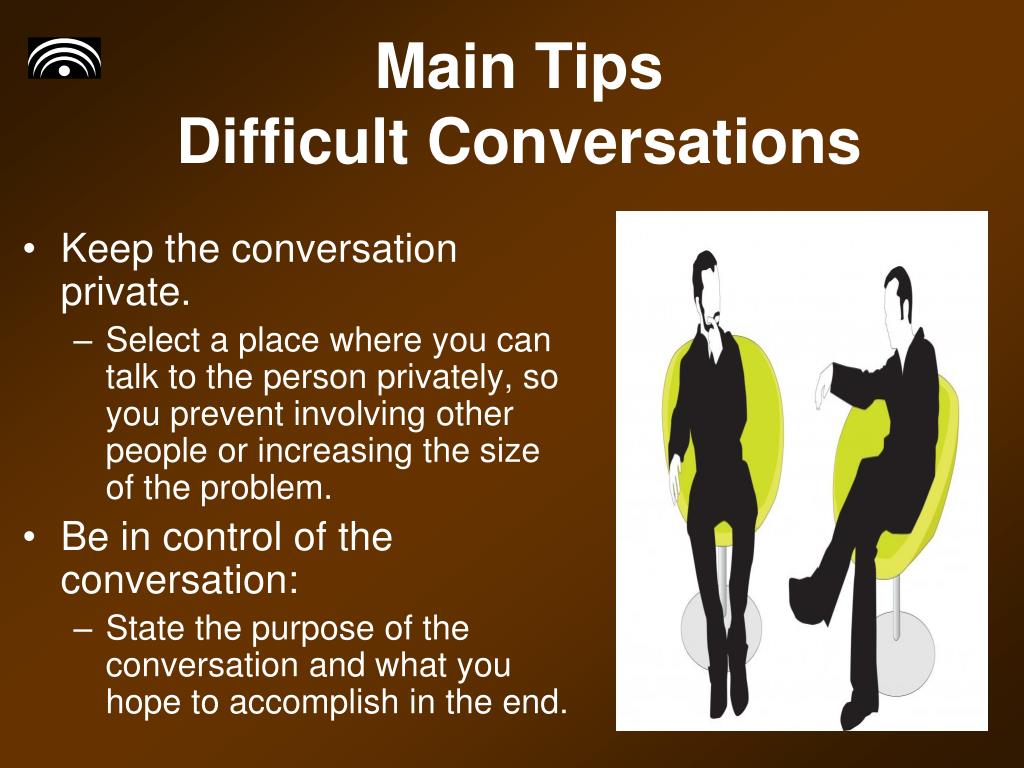Examples Of Difficult Conversations In The Workplace

The air crackles with unspoken tension. A performance review looms, hinting at potential layoffs. A colleague's behavior crosses professional boundaries. These are not isolated incidents, but rather symptoms of a larger issue plaguing workplaces worldwide: the avoidance of difficult conversations.
At the heart of this reluctance lies a complex interplay of fear – fear of conflict, fear of damaging relationships, and fear of legal repercussions. This article delves into the spectrum of challenging dialogues that frequently arise in professional settings, examining their impact on productivity, morale, and overall organizational health. We'll explore real-world examples, supported by data and expert insights, to understand why these conversations are so crucial and how to navigate them effectively.
Performance Concerns: Addressing Shortcomings and Potential Termination
One of the most fraught conversations involves addressing performance issues. A manager must delicately balance constructive criticism with the potential for hurt feelings and defensiveness. Data from SHRM (Society for Human Resource Management) consistently reveals that poorly managed performance reviews are a leading cause of employee disengagement and attrition.
Imagine a scenario: John, a sales representative, has consistently missed his quarterly targets. His manager, Sarah, needs to address the issue. Instead of skirting around the problem, Sarah uses specific examples, like, "John, I've noticed your sales numbers have been below target for the past two quarters. Can you help me understand what challenges you're facing?"
This approach focuses on collaboration and problem-solving rather than accusation. Alternatively, consider the even more challenging situation of potential termination. Terminating an employee requires meticulous preparation, legal compliance, and a high degree of empathy, as it significantly impacts the individual's livelihood and the team's morale.
Navigating Interpersonal Conflicts: Bullying and Harassment
Conflict between colleagues is another breeding ground for difficult conversations. These situations range from minor disagreements over project responsibilities to serious allegations of bullying or harassment. A recent study by the Workplace Bullying Institute (WBI) found that nearly 30% of U.S. workers have experienced bullying at work.
Imagine Emily witnesses a colleague, David, consistently making demeaning comments towards another team member, Lisa. Emily faces a moral dilemma: should she intervene? The decision to confront David, report the behavior to HR, or offer support to Lisa all require difficult conversations.
Ignoring such behavior can create a toxic work environment and lead to legal consequences for the organization. Addressing harassment, in particular, demands a swift and decisive response, guided by company policy and legal requirements.
Compensation and Promotion: Talking About Money and Advancement
Discussions about compensation and promotion can also be difficult. Employees often feel uncomfortable advocating for themselves, while managers may struggle to justify decisions that impact an individual's earning potential. Data from Payscale suggests that employees who proactively negotiate their salaries earn significantly more over their careers than those who don't.
Consider Mark, who feels he deserves a raise based on his contributions to the company. He needs to articulate his value proposition to his manager, Susan, using data and examples to support his request. He might say, "Susan, I've consistently exceeded expectations on my key performance indicators. I also contributed to the new X project that increased the company's profit by 20%."
Susan, in turn, needs to be prepared to explain the company's compensation structure and provide constructive feedback, even if she cannot grant the requested raise immediately. Transparency and open communication are crucial in these situations.
Addressing Unprofessional Behavior: Gossip, and Inappropriate Conduct.
Unprofessional behavior, like gossiping or inappropriate jokes, can erode trust and damage team cohesion. Addressing these issues often requires a direct, but tactful, conversation. Consider the scenario where a team member, Robert, is constantly making inappropriate jokes during team meetings.
Another team member, Maria, decides to address him privately. She could say, "Robert, I value your presence on the team, but some of your jokes make me and potentially others uncomfortable. I wonder if you'd consider refraining from those jokes during our meetings."
Such a conversation requires courage and sensitivity, but it can prevent the situation from escalating and creating a hostile environment.
Looking Ahead: Cultivating a Culture of Open Communication
The ability to engage in difficult conversations is a critical skill for managers and employees alike. Organizations can foster a culture of open communication by providing training on conflict resolution, active listening, and emotional intelligence. When difficult conversations are approached with empathy, preparation, and a focus on finding solutions, they can become opportunities for growth, stronger relationships, and a more productive and positive work environment. Ignoring these conversations, however, can lead to resentment, decreased productivity, and ultimately, a less successful organization.


















